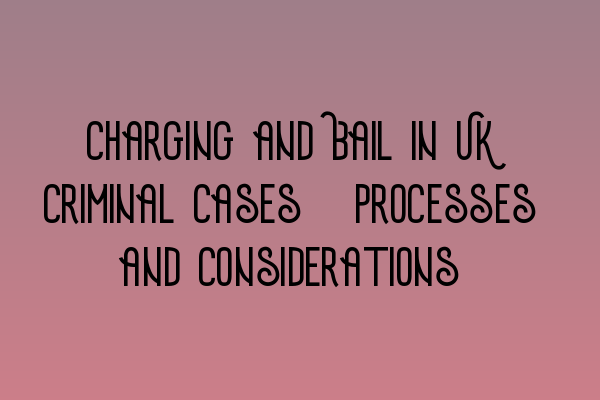Charging and Bail in UK Criminal Cases: Processes and Considerations
When it comes to criminal cases in the UK, the processes of charging and bail are crucial aspects that determine the course of legal proceedings. Understanding these processes and the considerations involved is vital for both legal practitioners and individuals involved in criminal proceedings. In this article, we will delve into the details of charging and bail in UK criminal cases, providing valuable insights into the procedures and factors to be taken into account.
The Charging Process
The charging process marks the formal accusation of an individual with a criminal offense. It is the initial step where the Crown Prosecution Service (CPS) decides whether there is enough evidence to proceed with the case. The CPS evaluates the evidence presented by the police and determines if there is a reasonable likelihood of conviction.
Once the CPS determines that there is sufficient evidence to support the charges, the accused person is formally charged with the offense. This typically occurs at a police station, where the individual is informed of the specific charges against them. It is essential for individuals facing charges to seek legal representation at this stage, as the advice and guidance of a skilled criminal lawyer can greatly influence the subsequent stages of the legal process.
After the charging process, the case moves onto the next stage, which is the consideration of bail.
The Consideration of Bail
Bail refers to the temporary release of an accused person while awaiting their trial. The decision on whether to grant bail or remand the individual in custody is a significant consideration that weighs various factors.
One of the primary considerations for granting bail is the risk of the defendant failing to appear in court. Factors like previous convictions, flight risks, and the seriousness of the alleged offense can influence this decision. The court aims to balance the defendant’s right to liberty with the need to ensure their attendance during legal proceedings.
Another crucial factor in the consideration of bail is the potential danger that the defendant may pose to the public or specific individuals. If there is a significant risk of harm or interference with witnesses, the court may be inclined to deny bail to protect the public interest.
The court also considers the likelihood of the defendant committing further offenses or interfering with the course of justice if granted bail. Factors such as the defendant’s criminal history, history of failure to appear in court, and the gravity of the alleged offense play a vital role in determining the decision on bail.
It is worth noting that the court has the power to impose conditions on a defendant’s bail. These conditions may include surrendering a passport, reporting to a police station regularly, or adhering to a curfew. These conditions ensure that the defendant complies with set restrictions and safeguard the interests of justice.
Conclusion
Understanding the processes of charging and bail in UK criminal cases is critical for legal practitioners and individuals involved in criminal proceedings. From the initial charging process to the consideration of bail factors, each stage plays a crucial role in shaping the course of legal proceedings.
If you are preparing for the SQE (Solicitors Qualifying Examination) and want to enhance your understanding of criminal law and practice, we offer comprehensive preparation courses to help you succeed. Our SQE 1 Preparation Courses and SQE 2 Preparation Courses are designed to equip aspiring solicitors with the knowledge and skills necessary to pass the exams.
For more information on SQE exam dates and to assess your preparation level, check out our related articles: SQE 1 Practice Exam Questions and SQE 1 Practice Mocks FLK1 FLK2. Stay on top of the latest updates and ensure a successful SQE journey with our comprehensive resources and expert guidance.
Legal matters require professional expertise and competent solicitors for effective representation. At SQE Criminal Law & Practice Law UK, we have a dedicated team of solicitors who specialize in criminal law. Contact us for expert advice and guidance on your criminal case.
